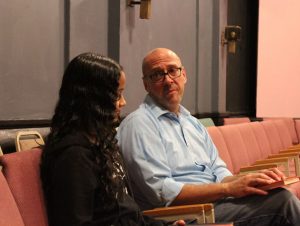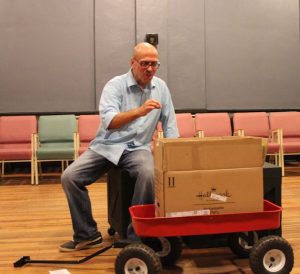‘Every Brilliant Thing’ a play with big, broad implications
 Every Brilliant Thing is a play with big, broad implications. Not only is it a career-defining tour de force for actor Rob Green and a conversation starter for suicide prevention, it is an invitation to the audience to examine a number of profound questions that pertain to their own daily lives.
Every Brilliant Thing is a play with big, broad implications. Not only is it a career-defining tour de force for actor Rob Green and a conversation starter for suicide prevention, it is an invitation to the audience to examine a number of profound questions that pertain to their own daily lives.
The play’s premise is stark indeed. A seven year old knows instantaneously that something’s wrong when he gets picked up  from school by his dad rather than his mother. As the passenger door flies open and he makes eye contact with his father, the ground opens beneath his feet and threatens to swallow him whole. On the ensuing ride home, his dad tells him that mom’s in the hospital. She did something stupid. She finds it hard to be happy. She feels she has nothing to live for.
from school by his dad rather than his mother. As the passenger door flies open and he makes eye contact with his father, the ground opens beneath his feet and threatens to swallow him whole. On the ensuing ride home, his dad tells him that mom’s in the hospital. She did something stupid. She finds it hard to be happy. She feels she has nothing to live for.
Anxious to know what happened and what it all means, the boy follows dad up the driveway, through the living room, up the stairs and to the threshold of his father’s study.  But instead of being ushering inside for a heart-to-heart father-and-son talk, the French doors close in his face. Inside the study, his father amps up a cacophonous jazz record. The boy knows that signal all too well. It means dad wants to be left alone. So the boy (mind you, he’s all of seven) ambles downstairs to make himself dinner – a ham and mayo sandwich without the ham – before falling asleep on the couch alone and befuddled.
But instead of being ushering inside for a heart-to-heart father-and-son talk, the French doors close in his face. Inside the study, his father amps up a cacophonous jazz record. The boy knows that signal all too well. It means dad wants to be left alone. So the boy (mind you, he’s all of seven) ambles downstairs to make himself dinner – a ham and mayo sandwich without the ham – before falling asleep on the couch alone and befuddled.
In the United States, between 7,000 and 12,000 children lose a parent to suicide each year. According to a study led by Johns Hopkins  Children’s Center in 2010 (and published in the Journal of the American Academy of Child & Adolescent Psychiatry), losing a parent to suicide makes children and teens three times more likely to die by suicide themselves. But an even greater percentage of those children and teens go on to develop a wide range of major psychiatric disorders that impede their ability to live happy, healthy and fully productive lives.
Children’s Center in 2010 (and published in the Journal of the American Academy of Child & Adolescent Psychiatry), losing a parent to suicide makes children and teens three times more likely to die by suicide themselves. But an even greater percentage of those children and teens go on to develop a wide range of major psychiatric disorders that impede their ability to live happy, healthy and fully productive lives.
Fortunately, children are remarkably resilient. These risk factors (known to researchers and psychiatrists as “stressors”) can be ameliorated by a loving, supportive family environment. But the 7-year-old who’s the subject  of Every Brilliant Thing doesn’t have that safety net. His father is cold, distant and emotionally unavailable, as the boy-turned-man recounts throughout the 80-minute performance in one heartbreaking recollection after another. So the boy comes to terms with his mother’s attempted suicide by making a list of everything that makes life special and worth living for – from ice cream to “things with stripes” to “the
of Every Brilliant Thing doesn’t have that safety net. His father is cold, distant and emotionally unavailable, as the boy-turned-man recounts throughout the 80-minute performance in one heartbreaking recollection after another. So the boy comes to terms with his mother’s attempted suicide by making a list of everything that makes life special and worth living for – from ice cream to “things with stripes” to “the  prospect of dressing up as a Mexican wrestler” (the prospect, not the actual dressing, mind you).
prospect of dressing up as a Mexican wrestler” (the prospect, not the actual dressing, mind you).
The boy relates that the list was intended to remind his mother just how much there is to live for in the world although, poignantly, “the love of your only son” never makes it onto the list. And perhaps composing a list of reasons for her to live is his way of demonstrating to his mother that he – if nothing else – is worth living for. But as he essentially lives in a solitary world without access to parental warmth and emotional support, the ever-expanding list becomes his life-affirming talisman for warding off the same debilitating depression that caused his mother to try to end her life.
As  the boy grows into manhood, his additions to the list continue to be a solitary pursuit until he meets a girl in college with whom he accidentally shares the list. And for a short, blissful time, the list becomes a shared experience. A mutual give-and-take. An exercise of shared emotions and world perspectives by two previously shy, introverted and, yes, damaged individuals.
the boy grows into manhood, his additions to the list continue to be a solitary pursuit until he meets a girl in college with whom he accidentally shares the list. And for a short, blissful time, the list becomes a shared experience. A mutual give-and-take. An exercise of shared emotions and world perspectives by two previously shy, introverted and, yes, damaged individuals.
But a positive mental attitude alone is not enough to inoculate someone from clinical depression. Without  hard work (which often necessitates counseling), it’s difficult to overcome the pervasive influence of bad role models. One day, we look in the mirror only to discover, for good or for bad, that we’ve become our mother or our father. And even a list of 1,000,000 brilliant things cannot save us from being cold, distant, aloof and emotionally unavailable, just like our parents. After all, it’s how
hard work (which often necessitates counseling), it’s difficult to overcome the pervasive influence of bad role models. One day, we look in the mirror only to discover, for good or for bad, that we’ve become our mother or our father. And even a list of 1,000,000 brilliant things cannot save us from being cold, distant, aloof and emotionally unavailable, just like our parents. After all, it’s how  they showed us to be (Konrad Lorenz called it “imprinting”).
they showed us to be (Konrad Lorenz called it “imprinting”).
Director Annette Trossbach and actor Rob Green deserve an incredible amount of praise and admiration for culling from British playwright Duncan Macmillan and comedian Jonny Donahoe’s brilliant script such a nuanced and multi-tiered interpretation of the personality and psychological underpinnings of this tender, sympathetic and all-too-relatable character. As he bares his character’s soul, Green exposes his own authenticity, sentimentality and sensitivity to the audience that surrounds him. From the opening scene with his imaginary dog  Sherlock Bones to the final scene bent lovingly over the typed list nestled in a Hallmark box dragged center stage in a red wagon, Green coverts his audience from spectators into friends and family members who want nothing more and will settle for nothing less than to give him what his parents never did – a warm embrace, a protective hug, and the affection that every child craves and deserves. Best of all, he does it with humor and a remarkable ability for mining the comedy in a play that deals at its core with ultra-serious subject matter. Good job by you, Rob Green.
Sherlock Bones to the final scene bent lovingly over the typed list nestled in a Hallmark box dragged center stage in a red wagon, Green coverts his audience from spectators into friends and family members who want nothing more and will settle for nothing less than to give him what his parents never did – a warm embrace, a protective hug, and the affection that every child craves and deserves. Best of all, he does it with humor and a remarkable ability for mining the comedy in a play that deals at its core with ultra-serious subject matter. Good job by you, Rob Green.
 But this is a play that goes far beyond the impact of attempted suicide on young children and impressionable teens. It goes far beyond the ability to go it alone with a forced smile, Coueistic aphorisms and a list that compels you to look for the positive in the experiences life throws your way. As produced and performed by Lab Theater, Every Brilliant Thing invites each of us to ask what hurt, lack of or absence from our childhood still exerts an influence on our day-to-day lives. What intended and unintended lessons did our parents teach us along the way which interfere with our present ability to interact and communicate with the people who are important to us? Do we truly understand the harm
But this is a play that goes far beyond the impact of attempted suicide on young children and impressionable teens. It goes far beyond the ability to go it alone with a forced smile, Coueistic aphorisms and a list that compels you to look for the positive in the experiences life throws your way. As produced and performed by Lab Theater, Every Brilliant Thing invites each of us to ask what hurt, lack of or absence from our childhood still exerts an influence on our day-to-day lives. What intended and unintended lessons did our parents teach us along the way which interfere with our present ability to interact and communicate with the people who are important to us? Do we truly understand the harm of self-indulgence and rampant narcissism and the value of empathy and emotional support (both giving and receiving)? And what are we teaching our own children and grandchildren by our own behavior – both with them and each other? Viewed from this vantage, Every Brilliant Thing is a play with big, broad implications that transcend even the important message that the playwrights intended to convey.
of self-indulgence and rampant narcissism and the value of empathy and emotional support (both giving and receiving)? And what are we teaching our own children and grandchildren by our own behavior – both with them and each other? Viewed from this vantage, Every Brilliant Thing is a play with big, broad implications that transcend even the important message that the playwrights intended to convey.
Sometimes  the conversations we need to have with ourselves and others are the ones that are the hardest to start. Go see this play. You’ll laugh. You’ll cry. But most of all, you’ll grow as a caring human being. And stay for the post-performance discussion for a conversation that could save a life, perhaps even yours. Or someone you know.
the conversations we need to have with ourselves and others are the ones that are the hardest to start. Go see this play. You’ll laugh. You’ll cry. But most of all, you’ll grow as a caring human being. And stay for the post-performance discussion for a conversation that could save a life, perhaps even yours. Or someone you know.
For tickets call 239.218.0481.
February 22, 2018.














 Tom Hall is both an amateur artist and aspiring novelist who writes art quest thrillers. He is in the final stages of completing his debut novel titled "Art Detective," a story that fictionalizes the discovery of the fabled billion-dollar Impressionist collection of Parisian art dealer Josse Bernheim-Jeune, thought by many to have perished during World War II when the collection's hiding place, Castle de Rastignac in southern France, was destroyed by the Wehrmacht in reprisal for attacks made by members of the Resistance operating in the area. A former tax attorney, Tom holds a bachelor's degree as well as both a juris doctorate and masters of laws in taxation from the University of Florida. Tom lives in Estero, Florida with his fiancee, Connie, and their four cats.
Tom Hall is both an amateur artist and aspiring novelist who writes art quest thrillers. He is in the final stages of completing his debut novel titled "Art Detective," a story that fictionalizes the discovery of the fabled billion-dollar Impressionist collection of Parisian art dealer Josse Bernheim-Jeune, thought by many to have perished during World War II when the collection's hiding place, Castle de Rastignac in southern France, was destroyed by the Wehrmacht in reprisal for attacks made by members of the Resistance operating in the area. A former tax attorney, Tom holds a bachelor's degree as well as both a juris doctorate and masters of laws in taxation from the University of Florida. Tom lives in Estero, Florida with his fiancee, Connie, and their four cats.